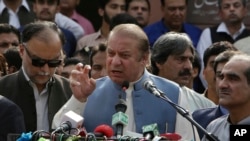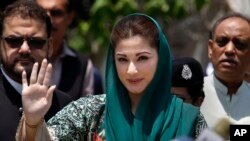Pakistan’s highest court has ordered ousted prime minister Nawaz Sharif, of the ruling party PML-N, to be removed as party leader.
The Supreme Court ruling Wednesday also quashed all decisions taken by Sharif since his disqualification as a member of the National Assembly last year.
“As a result of the above declaration, all steps taken, orders passed, directions given and documents issued by Respondent No.4 as Party Head after his disqualification on 28.07.2017 (July 28, 2017) are also declared to have never been taken, passed, given or issued in the eyes of the law,” the court decision read.
Sharif was thrown out as prime minister in a highly publicized case called the "Panama Papers" scandal, for failing to declare his salary from a company owned by his son as part of his assets on his nomination papers. Sharif claimed the decision was part of a conspiracy by the country’s powerful military to expel him from politics.
The judgement is viewed as a major blow to Sharif and his party since it has the potential to impact the upcoming Senate elections, as well as a recent by-election on a parliamentary seat won by Sharif’s party.
As party president, Sharif signed off on the nomination papers of his party’s candidates.
A senior journalist Suhail Waraich thinks the election commission might reach a compromise with the ruling party.
“I don’t think they’ll disqualify all of the party’s candidates or postpone Senate elections. So maybe they’ll give PML-N another chance to submit the names of their candidates,” he said.
Sharif’s daughter Maryam Safdar, seen by some as Sharif’s chosen heir apparent, changed her profile picture on Twitter to a picture of her father with the words, “I am also Nawaz, and I know how to fight for the right.”
Sharif, who was earlier removed from party leadership by the court at the time of his disqualification, returned to the top position when his party pushed through legislation called "Election Act 2017".
The new law was almost instantly challenged in the courts by several of the country’s main opposition parties.
Asad Umar, a senior leader of the opposition party Pakistan Tehreek-e-Insaaf or PTI, hailed the decision, saying it was good to see judges have not been intimidated by the intense pressure brought upon them by Sharif and his allies in recent months.
The decision, while damaging to the party in the short term, might strengthen the narrative of Sharif that he is a victim of manipulations by powerful institutions, according to Waraich.
Umar disagreed, saying the vote bank of Sharif’s stronghold, the rural areas of Pakistan’s most populous Punjab province does not favor the weak. “It goes in favor of somebody who’s strong and somebody who’s expected to win.”






